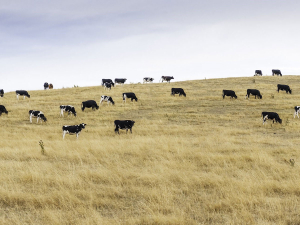State of the Dairy Nation 2024/25: DairyNZ Highlights Record Milk Production and Export Growth
DairyNZ's chief executive Campbell Parker says the 2024/25 dairy season reinforces the importance of the dairy sector to New Zealand.
 Levies are adjusted to reflect the latest industry farm gate values and slaughter volumes for dairy and beef stock.
Levies are adjusted to reflect the latest industry farm gate values and slaughter volumes for dairy and beef stock.
TB differential slaughter levy rates are changing with dairy animals paying $12.25/head, an increase of 75c from next month.
Ospri says that each year, the slaughter levy rates for beef and dairy cattle are reviewed under the TBfree Funders’ Agreement to ensure that the overall funding of the TBfree programme aligns with the agreed funding levels.
Levies are adjusted to reflect the latest industry farm gate values and slaughter volumes for dairy and beef stock.
The levy for beef animals drop by 25c to $4.50/head.
Ospri says The TB differential slaughter levy is collected to support funding of the programme on behalf of beef and dairy industries. The funding shares change annually based on shifts in the relative size and value of each industry.
“We communicate any adjustments to the differential slaughter levy to DairyNZ, Beef + Lamb New Zealand and Deer Industry New Zealand — the industry levy bodies in the TBfree Funders’ Agreement. Adjustments are made in line with the annual funding level specified.
“Adjustments in differential levy rates don’t provide an overall increase in the annual funding of the TBfree programme — but do ensure consistent funding to enable the programme to deliver.”
Ospri advises both beef and dairy farmers to keep their NAIT accounts up to date and record the correct animal type to ensure they are paying the correct TB slaughter levy.
The Meat Industry Association of New Zealand (MIA) today announced that Chief Executive Officer Sirma Karapeeva has resigned from the role.
The winners of the 2026 Hawke’s Bay/Wairarapa Dairy Industry Awards were announced at the annual awards dinner held at Copthorne Solway Park in Masterton on Thursday evening.
Environment Southland is welcoming this week’s decision by the Environmental Protection Authority (EPA) to approve the release of Blaptea elguetai, a leaf‑feeding beetle that will help control the highly invasive Chilean flame creeper.
This March, the potato industry is proudly celebrating International Women’s Day on 8 March alongside the International Year of the Woman Farmer, recognising the vital role women play across every part of the sector — from paddocks and packhouses to research, leadership, and innovation.
Fruit trader Seeka posted a record profit and returns to shareholders in 2025.
Recent weather events in the Bay of Plenty, Gisborne/Tairawhiti, and Canterbury have been declared a medium-scale adverse event.

OPINION: A mate of yours truly reckons rural Manawatu families are the latest to suffer under what he calls the…
OPINION: If old Winston Peters thinks building trade relations with new nations, such as India, isn't a necessary investment in…